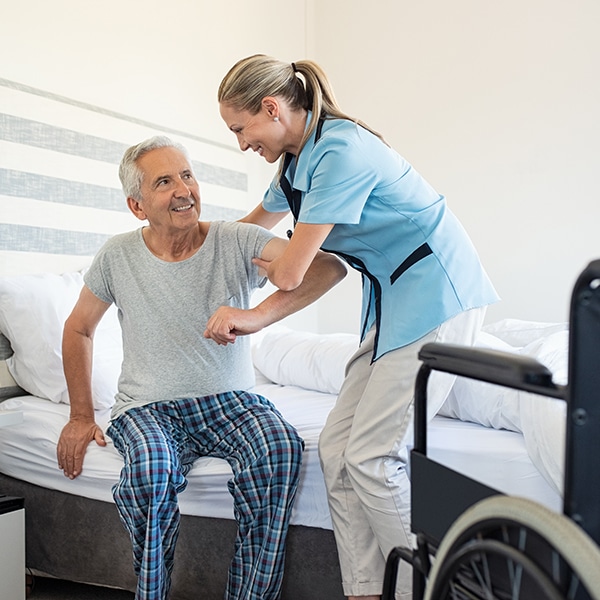Home Care for Chronic Diseases
We are a leading provider of comprehensive, in-home care in San Diego, offering individualized services ranging from occasional companionship to around-the-clock care. Each of our senior caregivers is a California licensed Home Care Aide, and they go through our careful selection process to ensure they demonstrate a true passion for care. We also have a full-time Registered Nurse on staff with over 30 years of experience to ensure we incorporate the best care planning possible.
At A Passion for Care, we believe the health and wellbeing of our senior community members are paramount. While we work directly with family members and close friends, we also partner with assisted living centers, church leaders, geriatric doctors, attorneys, hospice service providers, discharge planners at local San Diego hospitals, and other professional members of our community to ensure each elderly individual receives the care and support they need. We are well-known for our compassion, reliability, and professionalism – it’s how we’ve built long-lasting and trusted relationships with our partners throughout the San Diego area.
Home Care for Parkinson’s Disease
Parkinson’s disease is a chronic and progressive disorder of the nervous system that affects movement. It is caused by the degeneration or loss of certain nerve cells in the brain, called dopamine-producing cells. These cells play an important role in controlling muscle movement, and when they die, the brain loses its ability to properly regulate muscle activity. This leads to a wide range of symptoms, including tremors, stiffness, slowness of movement, and difficulty with coordination.
The symptoms of Parkinson’s disease typically develop gradually over time and may be mild at first, but they can become more severe as the disease progresses. Parkinson’s disease is a chronic condition, which means that it is ongoing and there is no cure. However, treatment options such as medication, physical therapy, and occupational therapy can help manage symptoms and improve quality of life for people living with Parkinson’s disease.
Other symptoms of Parkinson’s disease include:
- Balance and coordination problems
- Difficulty with fine motor skills
- Speech problems such as soft speech or monotone
- Writing difficulties
- Constipation
- Depression and anxiety
- Sleep disorders
It’s important to note that Parkinson’s disease is not just a disorder of movement, it also affects non-motor symptoms, which can have a significant impact on the patient’s quality of life.
Home care for Parkinson’s disease can involve a variety of services to help manage the symptoms and improve the quality of life for the individual. This can include assistance with daily activities such as bathing, dressing, and grooming, as well as help with medication management, meal preparation, and transportation to doctor appointments.
Home care can also include exercises to help maintain mobility and independence. Additionally, a home care provider can offer emotional support and companionship, which can be especially important for individuals with Parkinson’s disease who may be at risk of depression and social isolation.
Home Care for Chronic Heart Diseases
There are several types of chronic heart diseases, some of the most common include:
Coronary artery disease (CAD): This is a condition in which the arteries that supply blood to the heart become narrowed or blocked, increasing the risk of heart attack or angina.
Heart failure: This occurs when the heart can’t pump enough blood to meet the body’s needs, leading to fatigue, shortness of breath and swelling in the legs, ankles and feet.
Hypertensive heart disease: High blood pressure can lead to heart disease by causing the heart to work harder than normal, leading to thickening of the heart muscle, and damage to the heart’s blood vessels.
Cardiomyopathy: This is a general term for diseases of the heart muscle, which can cause the heart to become enlarged, thickened, or rigid, leading to heart failure.
Arrhythmia: This is a condition in which the heart beats irregularly or at an abnormal rhythm, which can cause symptoms such as palpitations, chest pain, and fainting.
Valvular heart disease: This is a condition in which one or more of the heart’s valves don’t work properly, which can lead to difficulty pumping blood to the body.
Atherosclerosis: This occurs when the inner lining of an artery is damaged, leading to the formation of plaque, which can clog the artery and restrict blood flow to the heart.
All of these chronic heart diseases can lead to serious complications if not properly managed, and the best way to prevent or manage the disease is to have regular check-ups, control risk factors and follow the doctors’ recommendations.
Non-medical home care can help individuals with chronic heart-related diseases in a variety of ways. Some examples include:
- Assistance with daily activities: Non-medical home care providers can assist with tasks such as bathing, dressing, and grooming, which can help individuals with chronic heart disease maintain their independence and quality of life.
- Medication management: Home care providers can help individuals keep track of their medication schedule and remind seniors to take their medications.
- Meal preparation: A home care provider can prepare meals that are low in salt and cholesterol, which can be beneficial for individuals with chronic heart disease.
- Transportation: Home care providers can provide transportation to doctor appointments and other medical appointments, which can be especially important for individuals with chronic heart disease who may have difficulty driving or using public transportation.
- Monitoring of symptoms: Home care providers can monitor individuals for signs and symptoms of complications related to their heart disease and take appropriate actions if needed.
- Emotional support: Home care providers can offer emotional support and companionship, which can be especially important for individuals with chronic heart disease who may be at risk of depression and social isolation.
Providing premier Home Care for Chronic Diseases for seniors and families in San Diego, La Jolla, Del Mar, Rancho Bernardo, Encinitas, Oceanside, Rancho Santa Fe, Point Loma, and surrounding areas.

Home Care for Post-Stroke Clients
There are two main types of strokes: ischemic strokes and hemorrhagic strokes.
Ischemic stroke: This occurs when a blood vessel that supplies blood to the brain becomes blocked, typically by a blood clot. This type of stroke accounts for about 87% of all strokes.
Hemorrhagic stroke: This occurs when a blood vessel in the brain ruptures and bleeds. Hemorrhagic strokes can be caused by high blood pressure, aneurysms, or other blood vessel abnormalities. This type of stroke accounts for about 13% of all strokes.
There are also other types of strokes that are classified by the underlying cause:
- Transient ischemic attack (TIA) or “mini-stroke”: TIAs are caused by a temporary blood clot or blockage, and symptoms usually last for only a few minutes or hours.
- Embolic stroke: This occurs when a clot or other debris forms in another part of the body and then travels to the brain, blocking a blood vessel.
- Lacunar stroke: This type of stroke is caused by damage to a small blood vessel deep within the brain, resulting in a small area of damage.
- Cryptogenic stroke: This type of stroke is one in which a cause cannot be found, even after a thorough evaluation.
It’s important to note that some of these types of stroke can have similar symptoms, so it is important to get a prompt and accurate diagnosis to determine the best course of treatment.
Non-medical home care can be a valuable resource for seniors after a stroke, as it can help them to manage their symptoms, maintain their independence, and improve their quality of life. Some ways in which non-medical home care can help a senior after a stroke include:
- Assistance with daily activities: Home care providers can assist with tasks such as bathing, dressing, and grooming, which can be challenging for seniors who have mobility or dexterity issues as a result of their stroke.
- Exercise: Home care providers can work with seniors to help them regain strength and mobility through exercises and other therapies that are tailored to their individual needs.
- Medication management: Home care providers can help seniors keep track of their medication schedule and ensure that they are taking the correct dosage at the right time.
- Monitoring of symptoms: Home care providers can monitor seniors for signs and symptoms of complications related to their stroke, such as changes in blood pressure or difficulty breathing, and take appropriate actions if needed.
- Emotional support: Home care providers can offer emotional support and companionship, which can be especially important for seniors who may be at risk of depression and social isolation following a stroke.
- Help with meal planning, preparation and feeding if needed.
- Help with mobility and transfer, providing a safe and secure environment.
Each of our senior caregivers is a California licensed Home Care Aide, and they go through our careful selection process.
We strive to provide the best, most compassionate care we can. Read more testimonials from Our Satisfied Clients.

Home Care for Seniors with Cancer
The most common types of cancer seen in seniors over 65 include:
- Prostate Cancer: This is the most common cancer in men, it starts in the prostate gland, which is a small gland that produces semen.
- Lung Cancer: This is the leading cause of cancer death among seniors, it starts in the cells lining the air passages of the lungs.
- Breast Cancer: This is the most common cancer among women and the second most common cancer overall in seniors.
- Colorectal Cancer: This cancer starts in the colon or rectum, it is the third most common cancer among seniors.
- Bladder Cancer: This cancer starts in the bladder, which is a muscle-lined sac in the pelvis that stores urine.
- Melanoma: This is a type of skin cancer that begins in the cells that produce pigment in the skin, it can occur in older adults.
- Leukemia: This is a cancer that starts in the blood-forming cells of the bone marrow, it can occur in older adults.
- Pancreatic cancer: This cancer starts in the pancreas, which is a gland located behind the stomach.
It’s important to note that cancer can affect anyone, regardless of age, and early detection is key to a better outcome. Regular check-ups, screenings and health screenings are important for seniors to detect any potential cancer early.
Non-medical home care can be a valuable resource for patients with cancer, as it can help them to manage their symptoms, maintain their independence, and improve their quality of life. Some ways in which non-medical home care can help patients with cancer include:
- Assistance with daily activities: Home care providers can assist with tasks such as bathing, dressing, and grooming, which can be challenging for patients with cancer due to fatigue or side effects of treatment.
- Medication management: Home care providers can help patients keep track of their medication schedule and ensure that they are taking the correct dosage at the right time.
- Monitoring of symptoms: Home care providers can monitor patients for signs and symptoms of complications related to their cancer, such as changes in pain levels or changes in vital signs, and take appropriate actions if needed.
- Emotional support: Home care providers can offer emotional support and companionship, which can be especially important for patients with cancer who may be at risk of depression and social isolation due to the stress of the illness and treatment.
- Help with meal planning, preparation and feeding if needed.
- Help with transportation to and from medical appointments.
- Help with light housekeeping, laundry, and shopping.
- Help with coordination of care with other healthcare professionals such as nurses, doctors, and other specialists.
Overall, non-medical home care can help patients with cancer to manage their symptoms, maintain their independence, and improve their quality of life. It also can provide a safe and comfortable environment for them to live in.
Home Care for Seniors with Arthritis
Arthritis is an umbrella term used to describe over 100 different types of conditions that affect the joints and surrounding tissues. Some of the most common types of arthritis include:
Osteoarthritis: This is the most common form of arthritis and is caused by the wear and tear of the cartilage that cushions the joints. It most commonly affects the hips, knees, hands, and spine.
Rheumatoid arthritis: This is an autoimmune disorder that causes inflammation in the joints, leading to pain, stiffness, and loss of function. It can affect any joint in the body, but most commonly affects the hands, feet, and wrists.
Psoriatic arthritis: This type of arthritis occurs in people who have psoriasis, which is a chronic skin condition. It causes inflammation in the joints and spine, and it can lead to damage in the joints, tendons, and ligaments.
Gout: This type of arthritis is caused by a buildup of uric acid crystals in the joints, leading to sudden, severe attacks of pain, redness, and swelling in the affected joint, usually the big toe.
Lupus arthritis: This type of arthritis occurs in people who have lupus, an autoimmune disorder that can affect many different parts of the body. It causes inflammation in the joints and can lead to damage to the joints, tendons, and ligaments.
Ankylosing spondylitis: This type of arthritis mainly affects the spine and sacroiliac joints (the joints between the spine and the pelvis) and can lead to fusion of the spine.
Each type of arthritis can have different symptoms, causes, and risk factors, and treatment options vary depending on the type of arthritis. It’s important to consult a doctor if you suspect you have arthritis so that an accurate diagnosis can be made and appropriate treatment can be prescribed.
Non-medical home care can be a valuable resource for seniors with arthritis, as it can help them to manage their symptoms, maintain their independence, and improve their quality of life. Some ways in which non-medical home care can help seniors with arthritis include:
- Assistance with daily activities: Home care providers can assist with tasks such as bathing, dressing, and grooming, which can be challenging for seniors with arthritis due to joint pain and stiffness.
- Stretching and Exercises: Home care providers can work with seniors to help them maintain their mobility and independence through exercises and other therapies that are tailored to their individual needs.
- Medication management: Home care providers can help seniors keep track of their medication schedule and ensure that they are taking the correct dosage at the right time.
- Monitoring of symptoms: Home care providers can monitor seniors for signs and symptoms of complications related to their arthritis, such as changes in joint function or inflammation, and take appropriate actions if needed.
- Emotional support: Home care providers can offer emotional support and companionship, which can be especially important for seniors who may be at risk of depression and social isolation due to the chronic nature of arthritis.
- Help with light housekeeping, laundry, and shopping.
- Help with mobility, transfer, and positioning to reduce the stress on joints.
We treat clients and their families with the utmost respect, ensuring we provide the best care possible.








